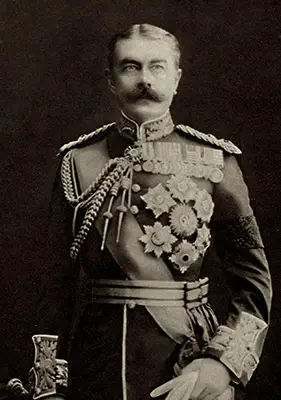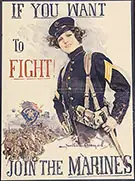Lord Kitchener
Horatio Herbert Kitchener was born on June 24, 1850 in Ballylongford, Ireland. He was the son of Lt. Colonel Henry Kitchener. This was a period of time when amazing things were happening around the globe.
Young Kitchener spent a large part of his youth in boarding school in Switzerland. Unfortunately, the young lord did not get to know his parents all that well. That may have played a huge part in the discipline that formed young Horatio.


By 1868, at the age of 18, Kitchener joined the Royal Military Academy in England. His education ended there when he received his commission as an officer in 1871 to the Royal Engineers. He sought to be in the military and seek a distinguished career.
Prior to his commission, young Kitchener served a short period with the French Army. There he would distinguish himself in military service in the ambulance corps. However, this did not set well with some in England as it violated articles of English neutrality from foreign service. The young man loved his country, but he also sought to serve and commence his military career.

Kitchener served a brilliant military career for the next 28 years. Much of his time was spent in Africa and Egypt at British military outposts. His career saw him spend time in the Egyptian army as an officer that was being re-built by the British. In 1884, Kitchener took part in the plan of relieving the British post in Khartoum; however, that expedition proved unsuccessful.
Later he would earn the designation as Earl of Khartoum because of his earlier action in the expedition and service with other regional conflicts. In 1889 Kitchener was set-up as the Governor General of Eastern Sudan. In 1889, Kitchener aided in repelling the Mahdist invasion into Egypt. Once again his skills and military strategies played into highlighting the military mastery that Kitchener seemed to possess.

Kitchener, leading the Egyptian army, began the methodical capturing of the Sudan in 1892. This was done having re-built the forces of Egypt. After a number of successful victories, Kitchener and his reoccupied Khartoum and became the Sudanese governor in 1898. In 1900, Kitchener was relocated to South Africa was involved in the Second Boer War.
Until the onset of WWI, Kitchener served as the Consul General in Egypt. By 1914, Lord Kitchener was called back to Britain. As the new Secretary of War, Kitchener knew that the battle in Europe was not going to be a quick walk in the park. He made plans for a long war that would be a matter of years in duration.

Lord Kitchener began a call for a volunteer army. Similar to the famous American adage that rang in WWII of Uncle Sam wants you, Kitchener’s face was placed on posters that read, “Your country wants you”. His pointed finger at the face of the reader, the poster was a call for all able men to form up. His hope was to ring up at least 100,000 men.
Kitchener believed in deeply that a volunteer force would stand a better chance at victory in the battles to come. His lack of fondness for the regular army was not hidden from those in the Cabinet. For the first couple of years he over saw munitions and battle strategy. The rest of the government cabinet found Kitchener often upsetting. Facing constant criticism for mistakes and in particular a shortage of shells for the army, Kitchener was facing major attacks from his peers.

After having his control of munitions and battle plans taken away from him, Kitchener offered to resign. However, the people of England still loved the lord and ideas of removing him were put on the back shelf. Bu when he was positioned with the dreadful fiasco of the Dardanelles Campaign, he faced further scorn by his fellow ministry associates.
In 1916, Kitchener was sent on a mission to encourage Russia not to leave the fighting of the Eastern Front. This would be Lord Kitchener’s final journey as the ship he was on struck a mine off the coast of England and the lord perished.
The Man that had battled the forces of the Egyptian army and had distinguished himself bravely, never saw the end of WWI and the Allied victories.



